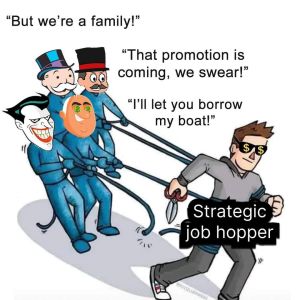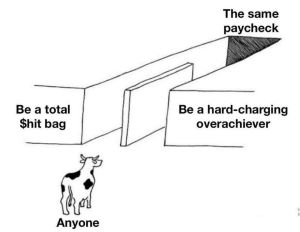Employment
Employment: Giving your time for someone else's in exchange of money
Introduction:
In a world filled with routine jobs and the perpetual pursuit of financial stability, it's natural to question whether humans are truly meant to work in the traditional sense. This article delves into the concept of employment, exploring the ideals of a utopian society and reflecting on the realities of our current system. While the sentiment expressed in the Q&A may resonate with many, it is essential to examine the purpose of work and consider alternative possibilities that can unlock the true potential of humanity.
Are humans meant to work?
Humans are retarded lower beings without higher thought. We could have had a free kingdom with free housing for all new couples built as needed little by little and everyone have what they need by trading resources and just being virtuous. Instead we have created money and a daily incessant 67 year commute to sit at a desk pushing papers. Sit at a computer. Or stand behind cash registers for an entire lifetime. We could work three days a week with a volunteer workforce to make food and manage basic goods. Instead because we are stupid lower beings without higher thought we have created an eternal prison for the soul.
The Q&A poses a thought-provoking perspective, envisioning a society where resources are shared, basic needs are met, and individuals are free from the constraints of the traditional workforce. This utopian vision highlights the desire for a world where humans can lead fulfilling lives without being bound by monotonous jobs. It challenges the notion that work should solely be driven by the pursuit of financial gain.
The Role of Work in Human Development:
While the concept of a "free kingdom" may seem enticing, it is crucial to recognize the potential benefits that work can provide for personal growth, skill development, and self-actualization. Work can offer a sense of purpose, allowing individuals to contribute their unique talents and make a positive impact on society. It fosters creativity, collaboration, and the opportunity to continually learn and evolve.
The Complexities of Modern Society:
The creation of money and the establishment of complex economic systems have undoubtedly shaped our society. The need for financial stability has propelled individuals into careers that may not align with their passions or ideals. The 67-year commute and the monotony of desk jobs described in the Q&A reflect the struggles many face in a world driven by productivity and profit.
Towards a Balanced Approach:
Rather than dismissing work as an eternal prison, there is an opportunity to explore a more balanced approach. This entails reimagining employment models, embracing flexible work arrangements, and prioritizing the well-being and fulfillment of individuals. By challenging the status quo, we can create a future where work is a means of personal growth and contribution, rather than a source of confinement.
Utopia or Realistic Vision:
While the utopian vision described in the Q&A may seem idyllic, its practical implementation raises questions about sustainability, resource management, and human nature. It is essential to strike a balance between fulfilling societal needs and ensuring individual freedom. As humans continue to evolve, there is room for collective exploration and innovative solutions that bridge the gap between work and personal fulfillment.
Conclusion:
The concept of work and its role in human society is a complex and multifaceted topic. While the Q&A reflects frustrations with the current employment system, it also highlights the potential for change and the pursuit of a more balanced and fulfilling future. By challenging conventional norms and fostering dialogue, we can work towards a society that harnesses the full potential of humanity, where work becomes a catalyst for personal growth, societal progress, and the realization of individual aspirations.

Employee vs Freelance
It's not always accurate to say that being a self-employed freelance coder is unequivocally harder than being an employee living paycheck to paycheck. Both lifestyles have their own set of challenges and advantages, and which one is "harder" depends on individual circumstances, personality, and priorities. Here's a breakdown of some key differences:
Challenges of being a freelance coder:
- Income insecurity: Unlike salaried employees, your income as a freelancer can fluctuate considerably month to month, potentially leading to financial stress. Finding consistent work can be challenging, and there's no guarantee of a regular paycheck.
- Self-motivation and discipline: You're your own boss, which means managing your own time, setting deadlines, and staying motivated can be difficult. Procrastination and self-doubt can become your biggest enemies.
- Marketing and sales: You're responsible for finding and securing clients, which requires marketing, networking, and sales skills. This can be time-consuming and resource-intensive, especially when starting out.
- Benefits and stability: As a freelancer, you typically lack the benefits and stability offered by traditional employment, such as health insurance, paid time off, and unemployment compensation.
- Taxes and paperwork: You're responsible for managing your own taxes and paperwork, which can be complex and time-consuming.
Challenges of being an employee living paycheck to paycheck:
- Lack of control: You have little control over your work schedule, tasks, and overall career direction. Decisions are made by your employer, and you may feel stuck in a job you don't enjoy.
- Limited earning potential: Your salary is set by your employer, and raises may be infrequent or small. Climbing the corporate ladder and significantly increasing your income can be a slow and competitive process.
- Job security: Your job security depends on the performance of the company and the overall economy. You could be laid off due to downsizing or other factors beyond your control.
- Stress and burnout: Dealing with office politics, demanding deadlines, and a lack of control can lead to stress and burnout.
So, which is harder?
Ultimately, it depends on your individual preferences and risk tolerance. Some people thrive on the freedom and potential rewards of freelancing, while others prefer the stability and predictability of a salaried job. Here are some things to consider:
- Do you value autonomy and control over your work?
- Are you comfortable with financial uncertainty?
- Do you have strong self-motivation and discipline?
- Are you good at marketing yourself and finding clients?
- Do you need the security of benefits and a regular paycheck?
Remember, there's no one-size-fits-all answer. Both freelancing and traditional employment have their own unique challenges and rewards. The key is to choose the path that best aligns with your personality, skills, and life goals.
What about Traders?
When considering traders in the context of Robert Kiyosaki's Investor Money Quadrant, it's important to remember that traders fall somewhere between the Employee and Business Owner sectors. They manage their own time and decisions, like a Business Owner, but their primary income comes from actively buying and selling financial instruments, similar to an Employee earning a salary. This unique position brings a specific set of challenges and risks:
Challenges:
- Volatility and market risk: Financial markets are inherently volatile, meaning prices can fluctuate rapidly and unexpectedly. This exposes traders to the risk of significant losses if their predictions are wrong.
- Psychological pressure: Trading often involves high stakes and the potential for quick gains or losses. This can lead to emotional decision-making, fear, and greed, hindering rational trading strategies.
- Skills and knowledge: Successful trading requires a deep understanding of financial markets, technical analysis, and risk management. Continuously updating knowledge and honing skills is crucial.
- Capital requirements: Depending on the trading strategy and assets chosen, initial capital can be quite high. Managing capital effectively and avoiding overleveraging is essential.
- Technology and platform reliance: Trading platforms and real-time data are vital tools, but technical glitches or cyberattacks can disrupt operations and lead to losses.
Risks:
- Financial losses: The inherent volatility of markets can lead to significant financial losses, potentially wiping out capital if not managed well.
- Psychological stress: The constant pressure of making decisions and facing potential losses can lead to stress, anxiety, and even depression.
- Burnout: The demanding nature of trading and the emotional rollercoaster can lead to burnout, affecting personal and professional life.
- Addiction: The thrill of trading and potential for quick gains can be addictive, leading to risky behavior and neglecting other aspects of life.
- Legal and regulatory risks: Depending on the instruments and strategies used, there may be legal and regulatory risks to consider.
Mitigating the challenges and risks:
- Develop a solid trading strategy: Having a well-defined plan based on research, analysis, and risk management guidelines is crucial.
- Practice discipline and emotional control: Maintaining a level head and avoiding impulsive decisions based on emotions is essential.
- Continuously learn and adapt: Staying updated on market trends, new strategies, and regulatory changes is key to long-term success.
- Manage capital effectively: Risk management and using appropriate leverage are crucial to avoid significant losses.
- Maintain a healthy work-life balance: Taking breaks, disconnecting from technology, and focusing on other aspects of life can help prevent burnout.
Ultimately, while the freedom and potential rewards of trading can be appealing, it's crucial to understand the specific challenges and risks involved and take steps to mitigate them before venturing into this demanding field.
Traditional Employment
Beyond the Cubicle: MoNoRi-Chan Redefines Success in a Tech-Driven World
For generations, the script for success was etched in stone: climb the academic ladder, swallow a mountain of student debt, land a cushy 9-5 at a corporate giant, and climb the internal ladder rung by rung. Titles like "Associate Accountant" or "Junior Lawyer" were badges of honor, worn with pride. But is this the only path to fulfillment? Enter MoNoRi-Chan, our tech-savvy protagonist, shattering conventions and proving that success comes in many forms, often beyond the confines of the traditional cubicle.
MoNoRi-Chan is a jack of all trades, a coding wizard and a trading whiz, weaving magic with lines of code and manipulating markets with his financial prowess. Forget the fancy math degree or classroom theories; MoNoRi-Chan believes in the "real math," the practical application of knowledge that transcends textbook formulas. He's living proof that ingenuity and hustle can trump pedigree any day.
MoNoRi-Chan's story isn't a rejection of education or hard work. It's a call to break free from the one-size-fits-all model and embrace diverse paths to success. It's a nod to the self-taught, the hustlers doesn't have to do much of the manual labor work, the creators who forge their own destinies beyond the beaten path.
This doesn't diminish the value of traditional careers. Kudos to those who find joy and fulfillment in the corporate world! But it's important to remember that "job titles" are not badges of honor, but tools for understanding different roles. Every job, from the barista brewing your latte to the plumber fixing your leaky faucet, deserves respect and admiration. There's no shame in wearing your work clothes with pride, regardless of their color or the industry they represent. (Except for landlords, they can suck this catboy's dick)
MoNoRi-Chan's story is a beacon of hope, a testament to the power of individual potential. It's a reminder that success can be measured in many ways, not just by corporate titles or the size of your paycheck. So, let's celebrate the MoNoRi-Chans of the world, the rule-breakers, the innovators, the ones who define their own success stories, one line of code, one trade, one unconventional step at a time.
The world needs more MoNoRi-Chans. What will your story be?
>real job
Firstly, you don't even know if this is their main income source. Secondly, work hard yourself so you can succeed in life and stop being mad somebody else gets to get paid doing what they like.

